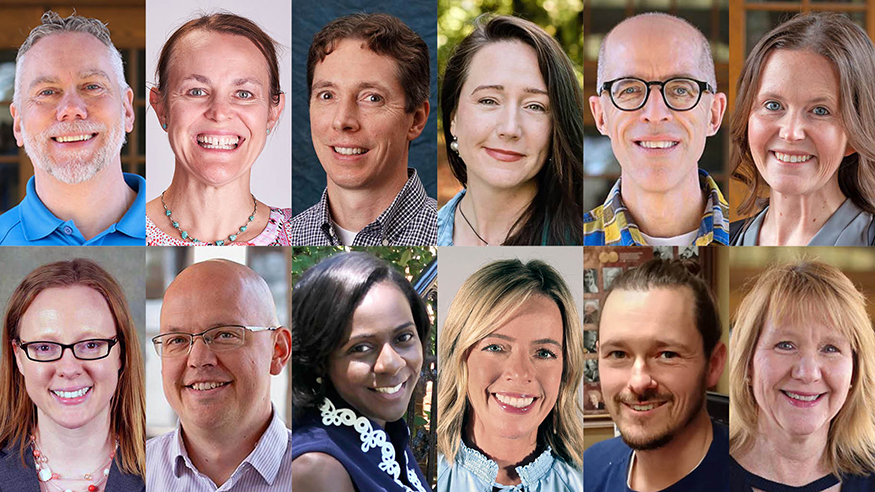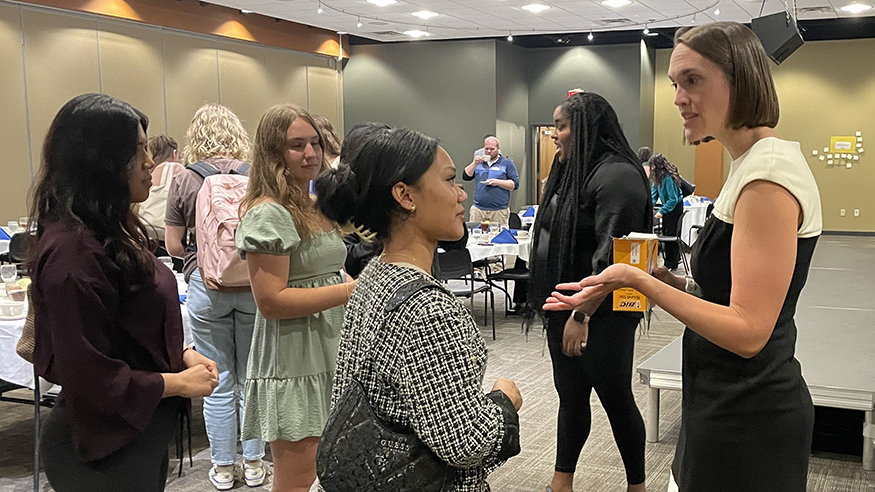2025-26 catalog
ANA BORDERIA-GARCIA, Associate Professor
B.A., Valencia; M.A., Ph.D., Iowa
AMERICA COLMENARES, Assistant Professor, non-tenure track
B.A., Augustana College; M.A., Kansas
JENNIFER HEACOCK-RENAUD, Associate Professor, non-tenure track
B.A., M.A., Ph.D., Iowa
JEFFREY RENAUD, Associate Professor
B.A., M.A., Ph.D., Iowa
JEANNETH VAZQUEZ, Professor
B.A., Central del Ecuador; M.A., Ph.D., Ohio State
Major in Spanish
32 credits, including SPAN-301 and SPAN-302; one peninsular culture course (SPAN-341 or SPAN-342); one Latin American culture course (SPAN-343 or SPAN-344); one linguistics course (SPAN-330 or SPAN-331); one 300-level literature course (SPAN- 351, SPAN-352, SPAN-353, or SPAN-354); 4 elective credits at 202 or above; and SPAN-490, a Senior Inquiry project both written and presented in Spanish. Participation in an International Studies Program in Spanish is highly recommended for all Spanish majors.
Major in Spanish for Professional Use
30 credits, including SPAN-301 and SPAN-302; one course in professional Spanish (SPAN-318 or SPAN-319); one peninsular culture course (SPAN-341 or SPAN-342); one Latin American culture course (SPAN-343 or SPAN-344); one linguistics course (SPAN-330 or SPAN-331); one 300-level literature course (SPAN-351, SPAN-352, SPAN-353, or SPAN-354); and 2 elective credits at 202 or above. The Senior Inquiry is completed within the department of the paired professional major.
Only students already accepted to a pre-professional program may apply for the Spanish for Professional Use major. These programs include Accounting, Biology, Business, Communication Sciences & Disorders, International Business and a variety of pre-health advising tracks. Contact the department with eligibility questions. Participation in an International Studies Program in Spanish is highly recommended for all Spanish majors.
Major for Teaching Spanish
34 credits, including SPAN-301, SPAN-302, SPAN-311; one peninsular culture course (SPAN-341 or SPAN-342); one Latin American culture course (SPAN-343 or SPAN-344); one linguistics course (SPAN-330 or SPAN-331); one 300-level literature course (SPAN-351, SPAN-352, SPAN-353, or SPAN-354); 4 elective credits at 202 or above; and SPAN-490, a Senior Inquiry project both written and presented in Spanish. Students are required to complete a study abroad program that focuses on study of Spanish language and culture. Please consult the Education Department for additional requirements.
Minor in Spanish
18 credits, including SPAN-301, SPAN-302, one peninsular culture course (SPAN-341 or SPAN-342), one Latin American culture course (SPAN-343 or SPAN-344),and 2 elective credits at 202 or above.
For interdisciplinary minors related to Spanish, see Latin American Studies and Linguistics.
For additional courses, see Spanish in the Andes Summer Program.
Grade Point Average Notation: All courses listed in the catalog as required courses for any major and/or minor, including those courses outside of the department or with a different subject coding, are considered part of the major and will count in the grade point average. Some departments may have additional grade requirements for the courses offered within their department. Recommended supporting courses that are optional and not required may also count in the major depending on the program. For more information see your department chair or the degree requirements for Bachelor of Arts and information on Majors/Minors.
Courses (SPAN)
Courses (SPST)



